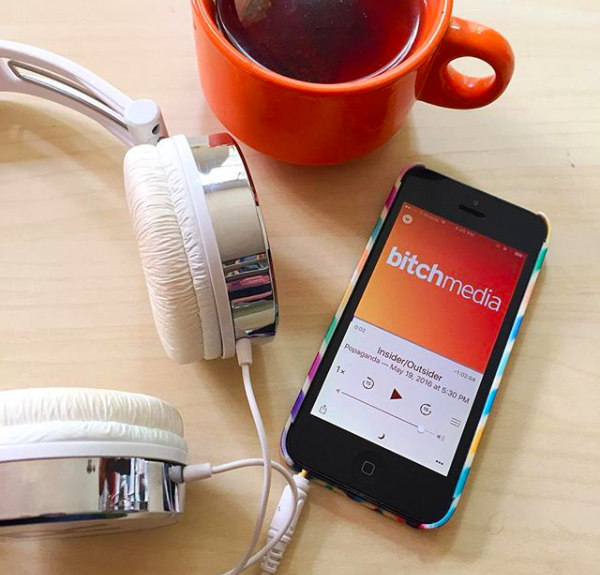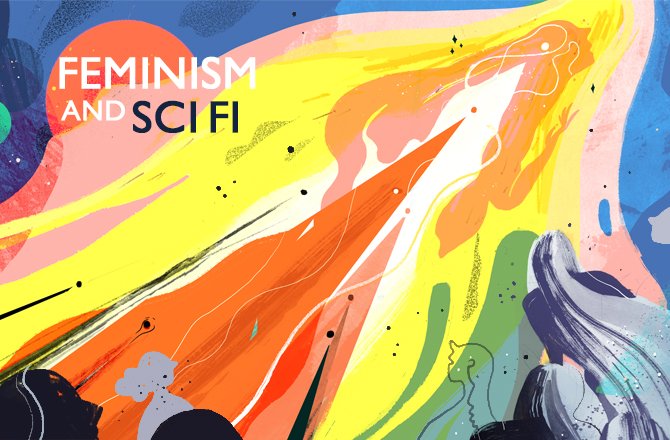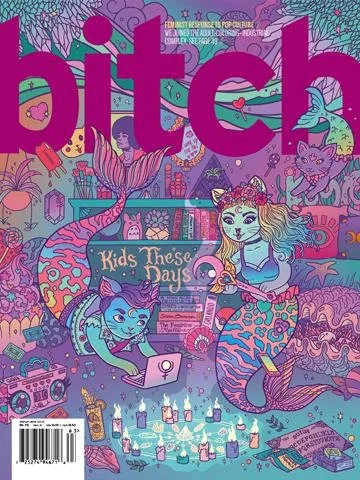WRITING AND EDITING CLIPS
As a journalist, I gravitate to covering issues of gender, history, and sexuality. I also love to interview people I'm curious about, from scientists to rock stars. Here are some of my favorite stories.
PODCAST HOSTING
From April 2013 to August 2017, I was the online editor of Bitch Media, the outspoken intersectional feminist media nonprofit founded in 1996. At Bitch, I hosted the feminism and pop culture podcast Popaganda. In that time, the listenership grew from under 1,000 listeners to roughly 12,000 per episode. Over the course of 120 episodes, I interviewed many of the country's most interesting writers, artists, and activists about their perspectives on gender, race, class, and sexuality in America. The show reported on pop culture ranging from the history of dissent at the Olympics to the racial politics of Disney movies.
A sampling of iTunes reviews:
This podcast is so incredible—looks at current events, music, art, food, and politics with the all-too-often unheard perspective of women and minorities. Always positive and eye-opening! —Allison, July 2016
Popaganda allowed me to begin the monumental process of distinguishing between the thoughts and feelings that are mine and the thoughts and feeling that other people have been telling me to have my entire life. It taught me that every feeling I have is valid, and that other women have those feelings, too. —Ashley, February 2016
As a college student, the topics discussed on Popaganda feel especially relevant to my life. Sarah Mirk has a candid yet non-judgmental way of investigating contemporary feminist issues and I love the array of guests she brings to the show. Popaganda seems like a very inclusive podcast, where the producers care about hearing many different voices. —Momo, December 2015
BITCH MEDIA EDITING
When I came onboard in 2013, Bitch was still very print-centric, with little social media presence and a website that qualified as vintage. In addition to managing a team of dozens of writers for the site and editing every article we published online, I took over the day-to-day operations of Bitch’s Tumblr, Instagram, Twitter, and Facebook. In my first two years, Bitch’s web traffic doubled and our social reach tripled. Every day of the week, we published compelling, original perspectives on pop culture, bringing much-needed feminist voices to discussions around film, television, media, and music.
From the hundreds of stories I edited, here are three of my favorites.
"TINA BELCHER'S SEXUAL REVOLUTION" by gabrielle moss
The sweet spot to hit with assigning and editing Bitch articles was to say something that resonated deeply, but that was also original. Gabrielle Moss's assessment of beloved character Tina Belcher became one of our most-read articles ever because it connected the dots between the animated show and real-life gender dynamics in a way that felt both powerful and hilarious. Read the story here.
"WILL FILMING THE POLICE KEEP US SAFE?" by victoria law
Bitch was a truly independent media outlet—which is increasingly rare these days. Our guiding light in editing articles was to ask: Does it say something new, crucial, and honest? Online, we published at least one long-form piece a month that dug into the intersections of politics and pop culture from a personal perspective. This essay by Victoria Law made points no one else was at the time—and is still all-too-relevant years later. Read the story here.
“Why we need to talk about race in adoption” by Nicole Chung
Nicole pitched this pointed personal essay to Bitch and I immediately knew it was something special. I picked it up for the site and shepherded it to publication. Nicole went on to write extensively about adoption, including a best-selling memoir, so I’ll always be proud to have worked on this piece way back when. Read the story here.
FEATURE REPORTING
"The dramatic history of american sex-ed films"
Published in bitch, june 2014
In 1948, in a seventh grade classroom in Eugene, Oregon, a teacher dimmed the lights and flipped on 16mm projector. A film called Human Growth began to play and for 20 minutes, a fictional teacher explained the human reproductive system while animated sperm and ovum flickered on-screen.
The presentation of these simple facts of life was so momentous that national magazines Time, Newsweek, and Life all covered the event—this was the first time a sex-ed film was ever shown in an American public school.
"interview with kathleen hanna on the strength it takes to get onstage"
PUBLISHED IN BITCH, SEPTEMBER 2013
The Julie Ruin just about burned down the stage at Portland’s Time Based Arts festival last Thursday night. The group kicked off the contemporary arts festival as part of a national tour to celebrate their album Run Fast and as front-woman Kathleen Hanna launched into their raucous playlist, the room suddenly felt hot, sweaty, and electric.
It’s a big deal for Hanna to be on stage at all. The singer who brought seemingly boundless energy to Bikini Kill and Le Tigre has spent the last six years dealing with the effects of Lyme Disease, which hinders both physical and neurological abilities. When we spoke in early September, Hanna talked about living with an invisible disease, how vulnerability can create true confidence, and how the best thing that ever happened to riot grrrl is critique.
"THE EMPOWERMENT CURE: HOW TEEN SEX-ED HAS UNDERGONE A BRILLIANT AND RAPID REVOLUTION"
PUBLISHED IN THE PORTLAND MERCURY, AUGUST 2013
The news on reproductive rights this year has not been good. Texas is shutting down health clinics, Ohio is forcing women to get an ultrasound before they get an abortion, Oklahoma is trying to restrict teens from buying Plan B over the counter—the country's reproductive options are generally going to hell in a Republican handbasket. But there's one area of reproductive health that has been quietly and steadily improving for years: reducing teen pregnancies. Near the end of the Bush administration, the teen birth rate rose for the first time since 1992. But from 2007-2011 (the five most recent years the experts crunched the numbers), the trend swiftly reversed and the teen birth rate nationwide dropped a whopping 25 percent.
"The Dead Freeway Society: The Strange History of Portland's Unbuilt Roads"
Published in the Portland Mercury, February 2009
Scattered all over Portland are artifacts of a city that could have been. Bikes rush down a concrete ramp on the west side of the Hawthorne Bridge that 40 years ago originally connected to an expressway instead of grass. Tiny Piccolo Park off SE Division was the site of homes demolished to make way for the pylon of an unbuilt freeway. These vibrant sites are tombstones. We are a city of dead freeways. While other American cities have built, built, built, Portland's freeway history is boom and bust: massive road projects were planned, mapped, and sold as progress by one generation, then killed by another. When current transit planners visit from exotic Houston and DC to admire Portland's progress, what they are really admiring are the roads not built—freeways erased from the maps decades ago.
my money story: the biggest thing I own is a mattress
HEARD NATIONALLY ON MARKETPLACE, JULY 2014
The biggest thing I own is my mattress. Some people have trucks or boats or houses or heirloom chests of drawers or ambitiously large desks or impressive, ill-conceived contemporary art pieces, but the most impressive thing I own just this big, squishy rectangle.
It might not seem like much, but getting this mattress was a major life step for me. When I first moved to Portland, Oregon six years ago, I was determined to furnish my room through only things I could get for free.











